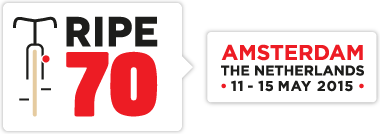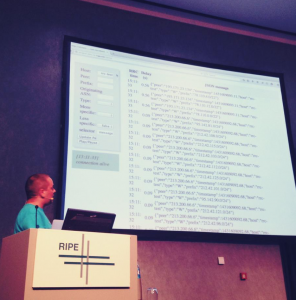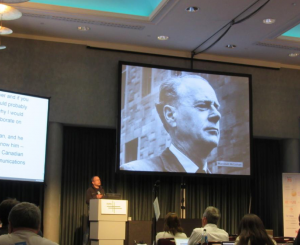Attendees checked in so far: 661
IPv6 Working Group – Sessions I & II
- Eric Vyncke gave a presentation on HTTP State Management (i.e. cookies) in an IPv6 world, which attracted a short discussion afterwards about how this problem could potentially be solved.
- Wilhelm Boeddinghaus spoke about use cases for IPv6 extension headers, followed by a long discussion about the pros and cons of filtering packets with extension headers and whether one should distinguish between different headers rather than filtering them all.
- Christopher Werny and Enno Rey spoke about operating behaviour in contradicting environments and recommend looking at RFC 3439, “Some Internet Architectural Guidelines and Philosophy”.
- Aaron Hughes gave an interesting overview of issues ISPs face today when deploying IPv6.
- Geoff Huston showed that only 30 providers are responsible for providing connectivity to 94% of the world’s IPv6 users.
- Nathalie Trenaman shared the fact that more than 400 RIPE NCC members stopped announcing their IPv6 prefixes, wondering what happened and what the reasons are.
- The IPv6 WG called for development of more enterprise-focussed Best Current Practice documents.
DNS Working Group – Session II
- Marek Vavruša presented a work in progress implementation of a new DNS resolver. It uses a layered approach and every layer can be replaced and dynamically influenced by LUA scripts.
- Marco Prause discussed how they were efficiently transferring the .de zone over long distance, high packet loss connections. They got the best results by switching the TCP congestion control algorithm to tcp-hybla.
- Ed Lewis discussed planning efforts for the root zone’s KSK roll over.
- Geoff Huston shared results of measurements on how potential bigger packet sizes affects resolvers and/or end users.
Open Source Working Group
- Dr. Thomas King gave a presentation on jFlowLib, a library that is able to read and write sFLow and IPFIX data in the format coming from Force10 and Alcatel Lucent boxes.
- Gianni Antichi presented on a community-owned platform for high-performance and low-cost network testing, with a lively discussion unfolding afterwards.
- After Patrik Wallström presented on Zonemaster and Steven Barth talked about the latest developments in OpenWrt, the session concluded with three lightning talks.
Routing Working Group
- Yasuhiro Ohara introduced a new tool, bgpdump2, for the analysis of bgp table dumps.
Several members in the room expressed gratitude for the RIPE NCC’s RIS service, and urged the RIPE NCC to finish development of the next generation RIS architecture and deploy it as soon as possible.
Cooperation Working Group – Sessions I & II
- The first session included various discussions of network neutrality, with speakers giving updates on the European situation, recent developments in the U.S. and the mobile industry perspective.
- Ben Zevenbergen’s recounting of the horse-trading that led to the Dutch government’s adoption of net neutrality legislation was a highlight.
- The second session included discussions on privacy, human rights in code, regulatory developments in Russia (from RACI attendee Alexandra Permyakova), and an update on the WSIS+10 preparations and what they mean for the RIPE community.
- Maria Häll closed the session noting that she will be stepping down as Cooperation Working Group Co-Chair after seven years.
Database Working Group
- There was a lively discussion on the use of passwords on RIPE Database updates via email, followed by Tim Bruijnzeel’s presentation on the RIPE Database.
- New proposals were discussed, including changes to orphaned
objects and changes to the “source:” field. - Other new proposals were discussed, including changes to orphaned
objects and changes to “source:” - Job Snijders presented on the results of the IRR data BoF
Following a full day of Working Group sessions, attendees travelled by canal boat to the Maritime Museum for a night of dinner, dancing and even a tour of an authentic VOC ship!














